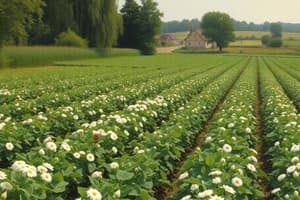Podcast
Questions and Answers
What is the primary goal of integrated pest management (IPM)?
What is the primary goal of integrated pest management (IPM)?
- Increase pesticide usage.
- Focus solely on chemical pest control methods.
- Minimize pesticide use while controlling pest populations. (correct)
- Eliminate all pesticides in agriculture.
Which of the following practices is considered a key preventative measure in pest management?
Which of the following practices is considered a key preventative measure in pest management?
- Chemical fertilization.
- Monoculture farming.
- Heavy reliance on pesticides.
- Crop rotation. (correct)
How can government policies affect agricultural production?
How can government policies affect agricultural production?
- By influencing subsidies and trade agreements. (correct)
- By providing tax increases for farmers.
- Through regulations that prohibit all farming activities.
- By eliminating consumer preferences.
What is one of the negative impacts of intensive farming methods?
What is one of the negative impacts of intensive farming methods?
Which of the following practices aligns with sustainable agriculture?
Which of the following practices aligns with sustainable agriculture?
What is the primary focus of modern agricultural practices?
What is the primary focus of modern agricultural practices?
What technique can enhance soil fertility and pest control?
What technique can enhance soil fertility and pest control?
Which irrigation method is designed to minimize water waste?
Which irrigation method is designed to minimize water waste?
What is an essential practice for maintaining soil health?
What is an essential practice for maintaining soil health?
Which aspect of livestock management directly influences animal health?
Which aspect of livestock management directly influences animal health?
What is the purpose of sustainable agricultural practices?
What is the purpose of sustainable agricultural practices?
Which technology enhances precision agriculture?
Which technology enhances precision agriculture?
What is an important component of pest and disease management?
What is an important component of pest and disease management?
Flashcards
What is agriculture?
What is agriculture?
The practice of cultivating crops and raising livestock for food, fiber, and other products.
What is crop production?
What is crop production?
Growing different plants for human and animal consumption, incorporating techniques like crop rotation and precision agriculture for optimal yields.
What is livestock management?
What is livestock management?
Carefully managing livestock like cattle, sheep, and poultry, ensuring their health and productivity with optimal feeding and disease prevention.
What is soil health?
What is soil health?
Signup and view all the flashcards
What is irrigation in agriculture?
What is irrigation in agriculture?
Signup and view all the flashcards
What is pest and disease management?
What is pest and disease management?
Signup and view all the flashcards
What is crop rotation?
What is crop rotation?
Signup and view all the flashcards
What is precision agriculture?
What is precision agriculture?
Signup and view all the flashcards
Integrated Pest Management (IPM)
Integrated Pest Management (IPM)
Signup and view all the flashcards
Agricultural Economics
Agricultural Economics
Signup and view all the flashcards
Preventative Measures in IPM
Preventative Measures in IPM
Signup and view all the flashcards
Environmental Impact of Agriculture
Environmental Impact of Agriculture
Signup and view all the flashcards
Sustainable Agricultural Practices
Sustainable Agricultural Practices
Signup and view all the flashcards
Study Notes
Agricultural Practices
- Agriculture encompasses the practices of cultivating crops and raising livestock.
- It plays a critical role in providing food, fiber, and other products for human consumption and use.
- Modern agricultural practices have evolved significantly, incorporating advancements in technology, techniques, and inputs.
Crop Production
- Crop production involves cultivating various types of plants for human and animal consumption.
- Different crops necessitate varying levels of water, sunlight, and nutrients.
- Techniques like crop rotation, intercropping, and agroforestry enhance soil fertility and pest control.
- Precision agriculture utilizes technology like GPS and sensors to optimize resource use, reducing waste and enhancing yields.
- Sustainable agricultural practices aim to minimize environmental impact and ensure long-term productivity by balancing crop production with ecological needs.
Livestock Management
- Livestock management encompasses the care and raising of animals like cattle, sheep, pigs, and poultry.
- Practices vary depending on the specific animal species and the desired outcomes.
- Feed quality and quantity significantly impact animal health and productivity.
- Disease prevention and animal welfare are crucial components in optimizing livestock management.
- Modern animal husbandry often leverages technology to improve efficiency and productivity.
Soil Health
- Soil is a fundamental component of agricultural systems, providing nutrients and support for plant growth.
- Soil health is crucial for maximizing agricultural productivity and ensuring long-term sustainability.
- Proper soil management practices, such as erosion control and nutrient replenishment, are essential for maintaining soil health.
- Techniques like cover cropping and composting can improve soil structure and fertility.
Irrigation Techniques
- Irrigation is often essential in regions with limited rainfall to ensure adequate water supply for crops.
- Different irrigation methods exist, including drip irrigation, sprinkler irrigation, and flood irrigation.
- Selection of the most suitable method depends on factors like water availability, crop type, and topography.
- Efficient irrigation practices aim to minimize water waste and maximize its impact on crop growth.
Pest and Disease Management
- Pests and diseases can significantly impact crop yields and livestock health.
- Integrated pest management (IPM) approaches minimize the use of pesticides while effectively controlling pest populations.
- Implementing appropriate preventative measures, such as sanitation and crop rotation, is key.
- Early detection and rapid response to disease outbreaks are crucial to mitigate losses.
Agricultural Economics
- Agricultural economics analyzes the economic aspects of agriculture, including production costs, market demand, and pricing.
- Understanding market trends, consumer preferences, and global trade patterns is important in agricultural decision-making.
- Government policies, subsidies, and trade agreements can significantly influence agricultural production and profitability.
Impact on Environment
- Agricultural practices can have both positive and negative environmental impacts.
- Intensive farming methods can lead to soil degradation, water pollution, and greenhouse gas emissions.
- Sustainable agricultural practices aim to minimize negative environmental impacts and promote ecological balance.
- Utilizing renewable energy sources and promoting biodiversity in agricultural systems fosters environmental protection.
Studying That Suits You
Use AI to generate personalized quizzes and flashcards to suit your learning preferences.




